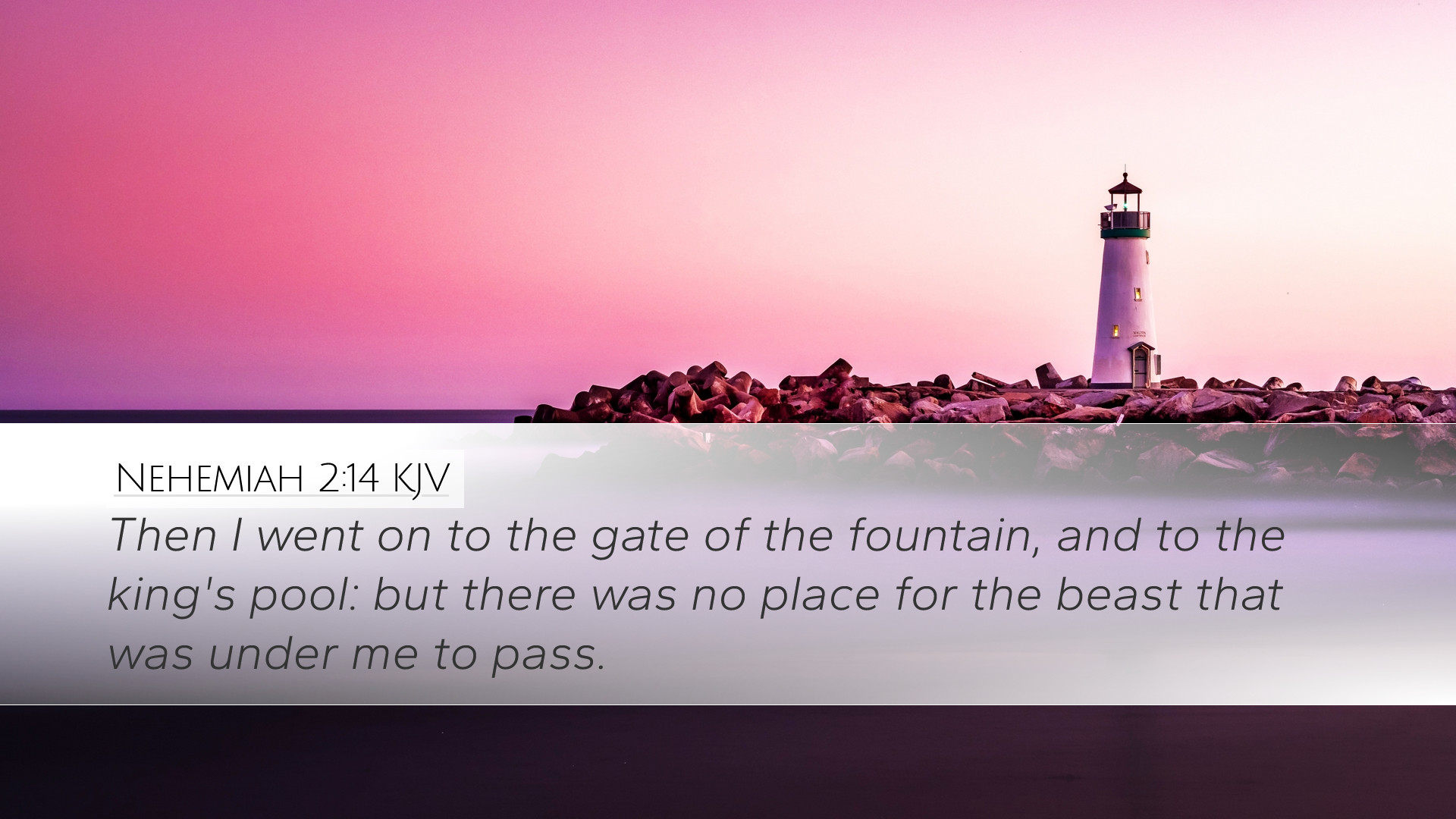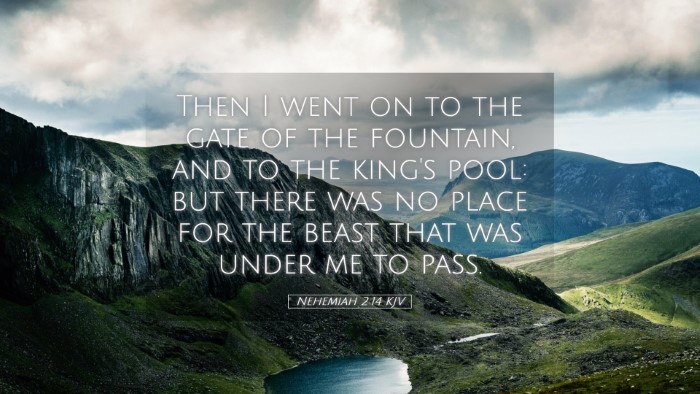Old Testament
Genesis Exodus Leviticus Numbers Deuteronomy Joshua Judges Ruth 1 Samuel 2 Samuel 1 Kings 2 Kings 1 Chronicles 2 Chronicles Ezra Nehemiah Esther Job Psalms Proverbs Ecclesiastes Song of Solomon Isaiah Jeremiah Lamentations Ezekiel Daniel Hosea Joel Amos Obadiah Jonah Micah Nahum Habakkuk Zephaniah Haggai Zechariah MalachiNehemiah 2:14
Nehemiah 2:14 KJV
Then I went on to the gate of the fountain, and to the king's pool: but there was no place for the beast that was under me to pass.
Nehemiah 2:14 Bible Commentary
Commentary on Nehemiah 2:14
Nehemiah 2:14 states: "Then I went on to the fountain gate and to the king’s pool, but there was no room for my mount to pass; so I went up in the night by the brook, and viewed the wall, and turned back and entered by the gate of the valley, and so returned."
Contextual Understanding
The context of Nehemiah 2:14 is crucial for understanding its significance. Nehemiah, appointed as the governor of Jerusalem, faces a desolate situation as he arrives. The walls of Jerusalem lay in ruins, signifying not only physical destruction but also a spiritual and communal degradation among the people of Israel. This verse exemplifies Nehemiah's methodical approach to reassessing the situation in the city and planning for its restoration.
Key Themes and Insights
- Leadership and Vision: Nehemiah's leadership is evident in his willingness to survey the damage discreetly before making any announcements or rallying the people. This shows the importance of assessing a situation thoroughly before taking action.
- Faith and Dependence on God: The decision to inspect the walls by night implies a dependence on divine guidance and protection. Nehemiah does not act presumptuously; rather, he seeks God's favor and wisdom in addressing the challenge ahead.
- Physical and Spiritual Restoration: The act of surveying the ruins speaks to the need for both physical and spiritual rejuvenation within the community. The dilapidated walls symbolize the need for renewed faith and discipline among the people of Israel.
Commentary Insights
Matthew Henry's Commentary
Henry emphasizes Nehemiah’s discretion in his actions. He notes that Nehemiah did not disclose his intentions to anyone immediately. Such caution is vital in leadership, especially when addressing sensitive issues within a community. Moreover, Henry underscores that Nehemiah viewed the wall by night to avoid drawing attention, illustrating both humility and wisdom in how leaders should approach challenges.
Albert Barnes' Notes
Barnes points out the significance of the "fountains" and the "king’s pool," highlighting these as metaphorical representations of sustenance and royal favor. The mention of the mount and the challenging conditions encountered further illustrates the serious state of the city. Barnes suggests that Nehemiah's difficult journey symbolizes the obstacles that must be faced when seeking to restore what has been lost for the glory of God.
Adam Clarke's Commentary
Clarke provides an in-depth exploration of Nehemiah's route and the physical state of the walls. He draws connections between Nehemiah's nocturnal observation of the walls and the Biblical theme of darkness representing sin and disrepair. Clarke emphasizes the psychological impact this inspection would have on Nehemiah, reinforcing his resolve and commitment to the task of rebuilding the city.
Application for Pastoral Ministry
For pastors and spiritual leaders, Nehemiah 2:14 serves as a powerful reminder of the importance of discernment in leadership. The ability to assess a situation quietly and thoroughly before presenting it to the congregation can cultivate a sense of trust and authority. Additionally, it highlights the need for leaders to engage in prayer and reflection, seeking divine guidance in the midst of challenges.
For Students and Theologians
For students of theology, the verse offers a rich narrative for the exploration of Biblical principles of leadership, community restoration, and divine reliance. It prompts rigorous examination of the dynamics between physical deterioration and spiritual vitality, urging deeper engagement with the text to draw parallels in contemporary church health and mission.
Reflection and Prayer
As you reflect on Nehemiah 2:14, consider the areas of your life or ministry that may require restoration. Seek God’s wisdom and guidance as you undertake your own assessment of personal and communal challenges, and remember to approach these tasks with the same secretive prayerfulness that Nehemiah modeled.


